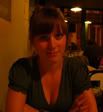Review of Are you there? by director Øystein Johansen
By NIKOLA SKOČAJIĆ
The audience was seated in the circle, so the raidus of the performance was 360 degrees. The actors – only two of them, a boy and a girl (might be lovers) had only a table, a chair per each and a threat of a hammer to work with. Artificially created conflict between the actors and the off-space, had a strange effect on the audience who was seated “in the battlefield” (at the same time, on – and off stage).
Are you there? is a mime performance from Holland, directed by Øystein Johansen, and staged in ODA theatre. As it’s been said, almost all the mime is directed to the off space, but a few sentences the audience hears from both of the actors (Guido Pollemans and Elsa May Averill), evoked the work by Samuel Beckett – in an introverted kind of way. This introversion lies in the fact that the extensive poetry of absurdity of waiting, was transformed from language (text) to vocal poetry of a few, but well designed sentences, which were there to be explored by repetition: “Someone is going to come. I can sense that someone is going to come, etc.” Every time the text was being repeated with an different intention, ranging from welcoming enthousiasm to terrifying fear. Every time it had to sound different, and considering that after a few minutes the audience knows it by heart – the text gets completely shared with the audience – it creates a certain ringing in the ear, without making it predictable.

These intoning differences caused a genre confusion in the first fifteen minutes of the play. The crowd laughed at their absurdist argument. And it was funny, but some of them continued to laugh all through the performance, even when the comedy slipped into it’s diametrical opposition: when the atmosphere turned grim and claustrophobic.
Are you there? is a performance based on the transfer of a special kind of emotion. Fear did not emerge out of any real danger. The fear felt real, because the actors seemed genuinely afraid. One thing that pointed that out is probably the position of the audience – the crowd wasn’t able to look towards the “expected” threat, because when the actors did that, they looked towards the audience.
It should be said, that there was no real relation between the two characters. It was sketched a few times, but still it was every man for himself. Considering the divided attention, a spectator often had to choose which one to watch. The performers were brave not to lean on the usage of light or sound, which were used, but in a very subtle way. The question “Are you there?” was obviously pointed at the audience, so someone might have answered – but was too afraid to do it. Everyone remained in their seats, and laughed while being afraid.













